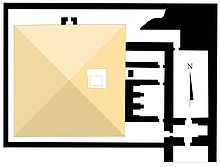Khuit
- For a Queen from the Fifth dynasty of Egypt named Khuit, see Khuit I.
| Khuit in hieroglyphs | ||||||
|---|---|---|---|---|---|---|
xwit | ||||||
| | ||||||
Khuit II was a wife of King Teti, the first pharaoh of the Sixth dynasty of Egypt.[1]
Biography
Khuit may have been the first prominent royal wife from the reign of Teti. If so, her position would later be taken over by Iput I. Khuit may have been the mother of King Userkare (according to Jánosi and Callender),[2] but this is not at all certain and some would have a queen named Khent[kaues?] as the mother of Userkare.[3] Khuit's daughter could be Seshseshet Sheshit.[4]
According to her monuments Khuit held the titles:
- King’s Wife (ḥmt-niswt) and King’s Wife, his beloved (ḥmt-niswt mryt.f)
- Companion of Horus (smrt-ḥrw)[5]
Burial

The pyramids of Iput I and Khuit were discovered between July 1897 and February 1989 by Victor Loret just north of Teti's pyramid complex at Saqqara.[6]
Loret initially thought Khuit's tomb was a mastaba. Excavations in the 1960s by Maragioglio and Rinaldi first suggested that Khuit had been buried in a pyramid. Remains of masonry belonging to the ruins of a small mortuary temple were found as well. Further excavations in 1995 by Hawass have confirmed that Khuit's tomb was a pyramid. Excavations of the pyramid itself revealed a burial chamber with a pink granite sarcophagus. The mortuary temple associated with her funerary complex is located to the east of the pyramid. The temple included an offering room with a false door and an altar. The temple walls were decorated and showed scenes of offering bearers.[2]
| Wikimedia Commons has media related to Pyramid of Khuit II. |
References
- ↑ Aidan Dodson & Dyan Hilton, The Complete Royal Families of Ancient Egypt, Thames & Hudson (2004) ISBN 0-500-05128-3, p.76
- ↑ 2.0 2.1 Verner, Miroslav. The Pyramids: The Mystery, Culture, and Science of Egypt's Great Monuments. Grove Press. 2001. ISBN 0-8021-3935-3
- ↑ Dodson, Aidan and Hilton, Dyan. The Complete Royal Families of Ancient Egypt. Thames & Hudson. 2004. ISBN 0-500-05128-3
- ↑ N. Kanawati, Mereruka and King Teti. The Power behind the Throne, 2007, p. 20, 32 et 35
- ↑ Grajetzki, Wolfram Ancient Egyptian Queens: A Hieroglyphic Dictionary, p.22
- ↑ Lauer, Jean Phillipe. Saqqara: The Royal Cemetery of Memphis, Excavations and Discoveries since 1850. Charles Scribner's Sons. 1976. ISBN 0-684-14551-0
![Aa1 [x] x](/2014-wikipedia_en_all_02_2014/I/media/h/i/e/r/hiero_Aa1.png)
![G43 [w] w](/2014-wikipedia_en_all_02_2014/I/media/h/i/e/r/hiero_G43.png)
![M17 [i] i](/2014-wikipedia_en_all_02_2014/I/media/h/i/e/r/hiero_M17.png)
![X1 [t] t](/2014-wikipedia_en_all_02_2014/I/media/h/i/e/r/hiero_X1.png)